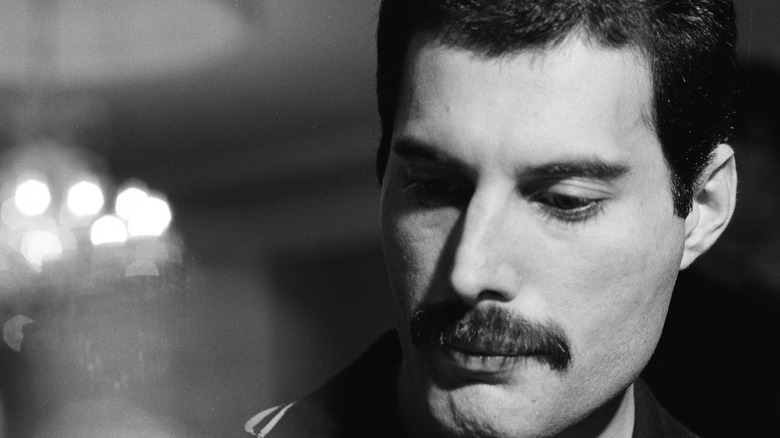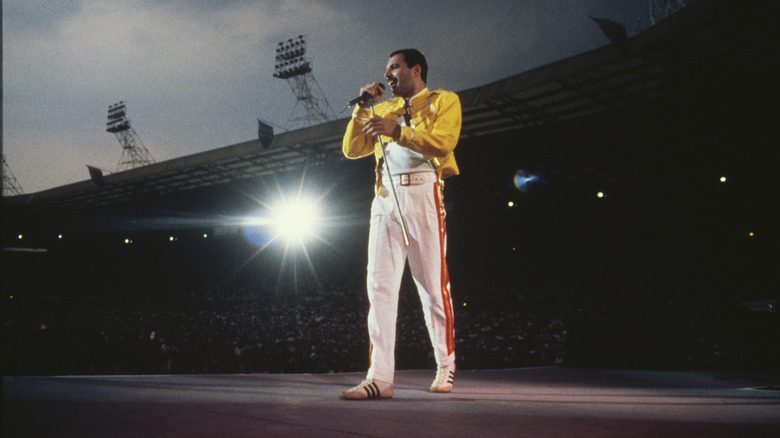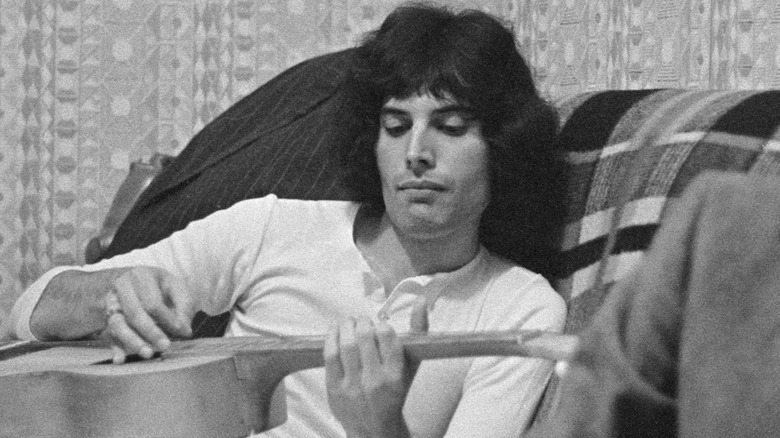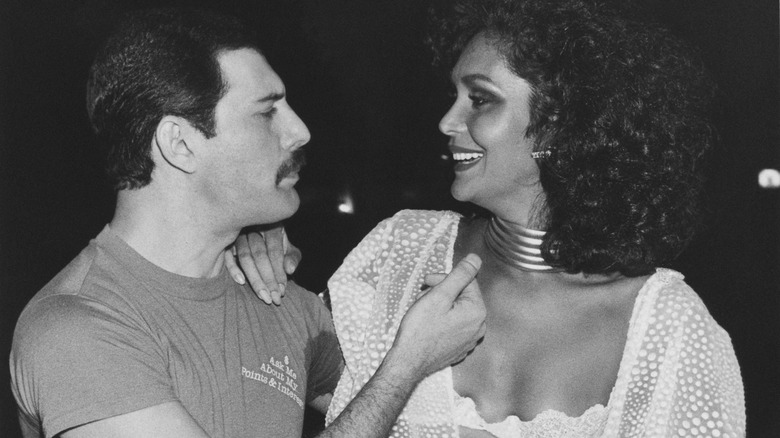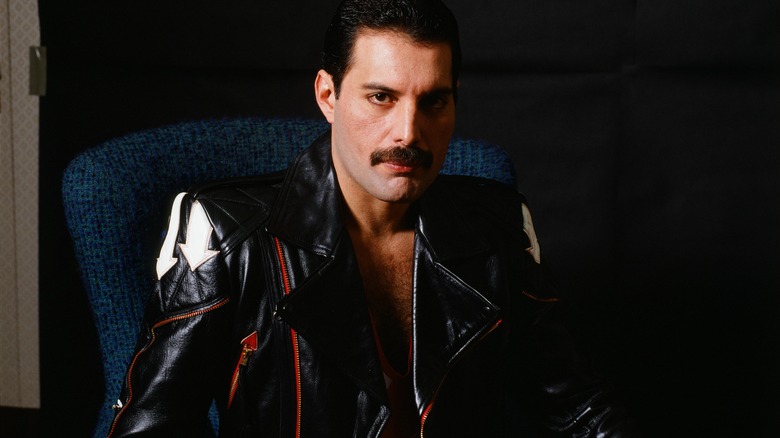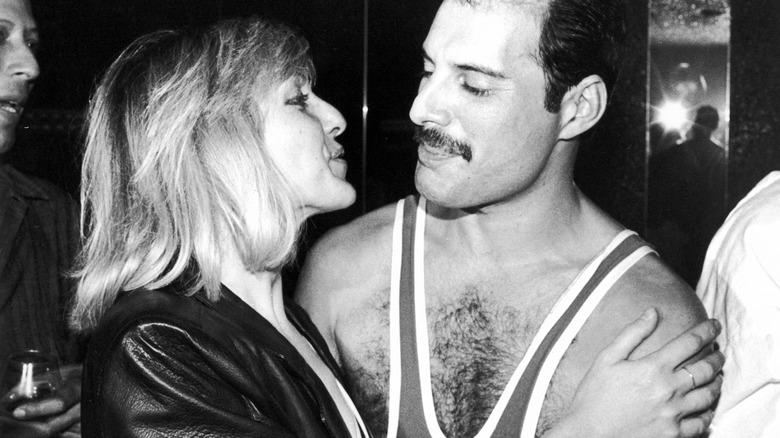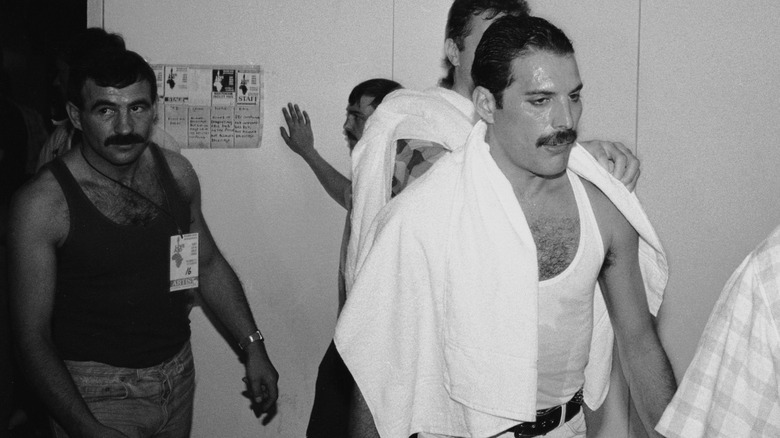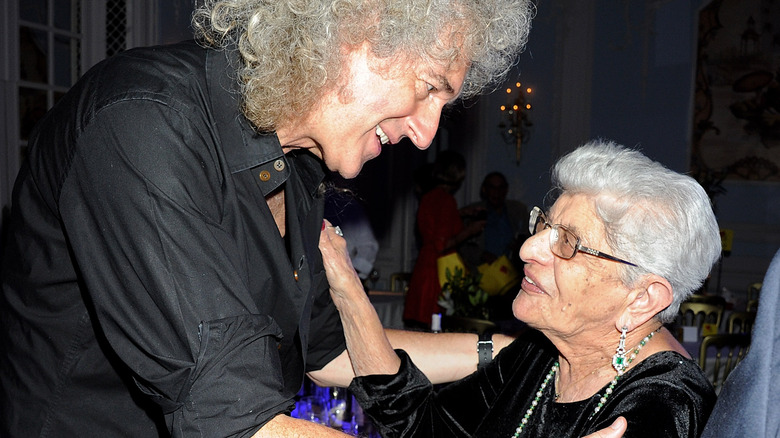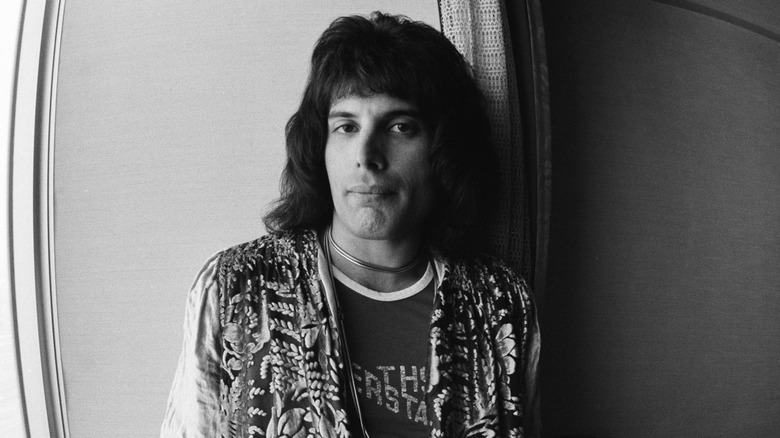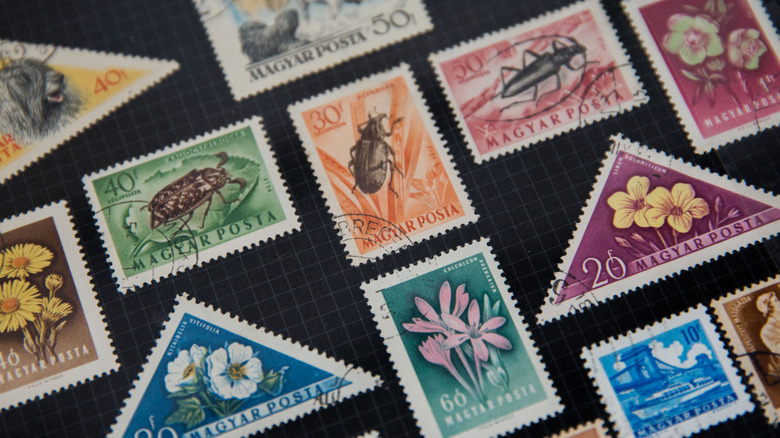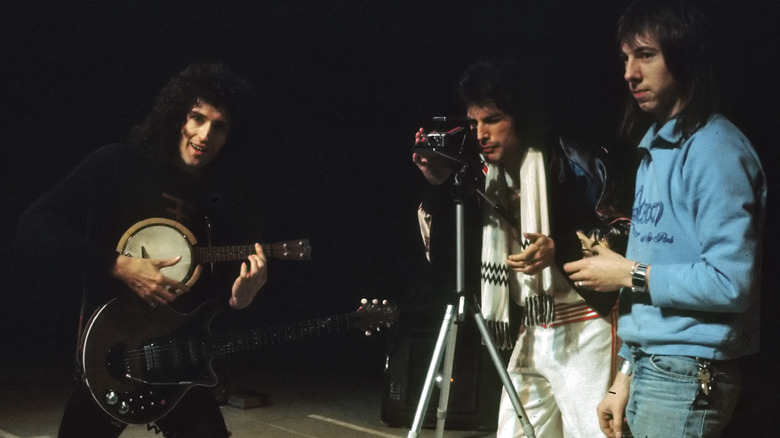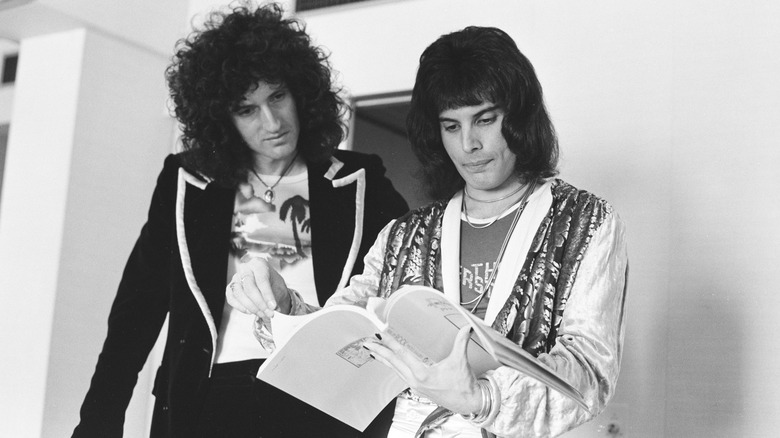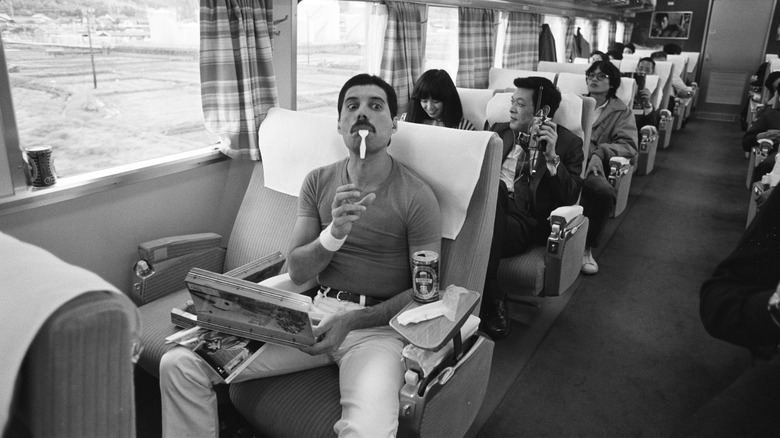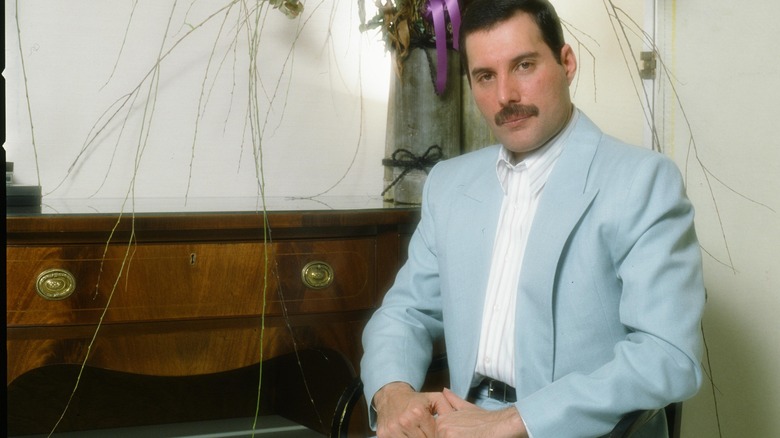What Freddie Mercury's Private Life Was Really Like
Sure, there are a lot of incredible musicians out there, but here's an absolutely undeniable fact: Few could — or can, or will be able to — command a stage and connect with a stadium full of people like Queen frontman Freddie Mercury. Simply put, everything about him was epic, and unfortunately, he's one of the many musicians the world lost way too soon.
Mercury — who was born with the name Farrokh Bulsara — always went out of his way to separate his on-stage and in-the-studio life as a musician from his private life. And he was really good at it, too, which means we don't know nearly as much about his personal life as we know about pretty much any celebrity today.
There's another reason for that mystery, too. The British Postal Museum says that after his death in 1991, most of his personal possessions were destroyed. (A postal museum? Yes, it'll all become relevant!) Mercury's family was Zoroastrian, and traditional beliefs involve burning the possessions of the deceased. Few items survived, and while that means there's a lot about his private life that has been lost forever, there are some fascinating, behind-the-scenes stories that have been preserved, mostly by those who loved the man behind all the rock star glamor.
His boarding school classmates didn't recognize Freddie Mercury
Freddie Mercury was born in Zanzibar, and his given name was Farrokh Bulsara. When he was enrolled in St. Peter's School, he was already asking that his classmates call him Freddie — it was, after all, much preferred to the nickname he was given: Bucky (via The Better India).
The boarding school was located in Maharashtra, India, and Mercury enrolled when he was 8 and left when he was 12. According to The Better India, it was at that school that someone outside of his family first realized what a talent for music he had. Even then, he could instantly perform songs that he had just heard for the first time.
But Mercury was far from the commanding presence and the showman he would become later. When the Hindustan Times spoke with some of his former classmates in 2018, they remembered a shy boy who was picked on mercilessly for his teeth. Classmate Ajay Goyal recalled: "He was shy, but never a nobody."
After boarding school, Mercury moved back to Zanzibar (the family moved to England later, in 1964). Shockingly, it wasn't until around 2015 that Goyal realized the rock legend that was Freddie Mercury was the same person he'd called Bucky in school. "I'd heard of Freddie Mercury, of course, but I'd never made the connection with Farrokh. I was living in Montreal, Canada, when Queen played there. I would have attended the concert if I'd known it was him."
He had a complicated relationship with his race and nationality
The Better India says that when Freddie Mercury kicked off his musical career by joining a band called The Hectics, he was still at boarding school. The group performed covers of some of the massive American and British hits of the day, putting their spin on artists like Elvis and Little Richard. Many of Mercury's musical idols were all black or white, and according to BBC, that put the young, aspiring star in something of an odd position.
Singer-songwriter Leo Kalyan summed it up like this: "There's no room for brown people in the Western music industry, and Freddie kind of knew that. [He was] smart enough to know that he basically had to masquerade as a white man to succeed."
Brian May agreed, saying that it was after he had decided to try to break into the music business in London that he stopped going by his last name of Bulsara, and adopted the name, Mercury. While Mercury himself hadn't spoken openly about the racially-driven discrimination and prejudice he may have faced, May's insight into his long-time friend is undoubtedly pretty accurate, and he explained to BBC, "The Bulsara person was still there, but for the public, he was going to be this different character, this god."
He never confirmed or spoke about his sexuality
Queen and Freddie Mercury were in their heyday during the 1970s and 1980s, and that's some important context for understanding why Mercury never spoke about or confirmed his sexuality. Biography says that although he was frequently seen in the company of both men and women, he never addressed his romantic life in a public way.
That's not entirely surprising for a few reasons, and while no one can be sure exactly why he remained mum on the topic, there's a safe guess: At the time, the world was still wildly homophobic. In the 1980s, there was something else going on: the AIDS crisis. AIDS and HIV were still not understood and condemned as a "gay cancer," according to Biography.
Mercury didn't seem to talk about it much privately, either. The closest conversation that has come to light is one that he had with Mary Austin, a woman he dated and was engaged to before they called off a romantic relationship in lieu of a lifelong friendship. Even she has said that she always thought he was gay, but he told her that he was bisexual. If there was anyone he would speak freely with, it would be her: She told Daily Mail that one of his last requests was that she collect his ashes and bury him secretly — without even telling his parents where he was laid to rest. He was afraid of vandalism, and to this day, his final resting place remains a secret.
He told his devoutly religious parents his lover was the gardener
When the Freddie Mercury biopic "Bohemian Rhapsody" hit theaters, everyone had an opinion. The Los Angeles Times says the movie was condemned for only touching on Mercury's relationships with men and with his parents. But there's actually a good reason for the omissions: Mercury kept those things private. He kept them so private, in fact, that Biography says that he never told his parents that he dated men. When they asked him about a man who was living with him in London, he explained the man's presence by telling them that he worked for him as a gardener.
And that kind of makes sense. His family was both Indian Parsi and practicing Zoroastrian, and while Mercury himself wasn't religious (although he did observe coming-of-age and end-of-life traditions), he was deeply and unwaveringly respectful of his parents' faith. That faith, however, taught that gay men could "be killed with impunity," says Encyclopedia Iranica. They further say that gay men were seen as demons promoting the spread of evil in the world, so it's little wonder then, that he simply kept that part of his life out of discussions with his parents.
He never told them about his HIV/AIDS diagnosis either. His mother, Jer Bulsara, told The Telegraph, "He protected us by never discussing these matters." She did, however, know that he was dying and visited him regularly even though he never said anything to her about being ill.
He described one woman as the love of his life
There were two sides to Freddie Mercury, and one of the only people who knew the private version was Mary Austin. They met in 1969 — when he was 24, and she was 19 — and at the time, he was just that guy with dreams of becoming a rock star. Mercury proposed to her in 1973, says Vanity Fair, and wrote the song "Love of My Life" for her.
When she spoke to the Daily Mail in 2013, she invited them into the home he had left her. The mansion was as he'd left it, filled with Louis XV furniture and enough art and antiques to outfit a small museum. She explained, "Why would I want to change it? It is his taste and style. It's beautiful. His presence is everywhere."
Even after calling off the wedding with Mercury's admission that he was bisexual, they remained close friends, and she was one of the handful of people who stayed by his side as he died. She shared a poignant memory of sitting with him during some of his last days, watching videos of some of Queen's concerts.
"On one occasion, he turned to me and said sadly, 'To think I used to be so handsome.' I got up and had to leave the room, it was too upsetting. We were never allowed to get emotional around him, and that was hard. But I knew if I sat there, I would have been in tears," Austin said.
Long-time lover Jim Hutton paints a picture that's wonderfully ordinary
Freddie Mercury and Jim Hutton (left) met in the 1980s, says Vanity Fair. The first time Mercury offered to buy him a drink at the London nightclub called Heaven, Hutton declined. It took another year and a half and another offer of a drink before they connected and started dating. A few years later, Hutton was at his side as Mercury died.
Hutton was at his side for some monumental events before that — like LiveAid — and some wonderfully ordinary events, too. The Freddie Mercury that existed apart from the force of nature that was on stage was incredibly different, and he once described their home life in Vanity Fair: "I'd get in from work. We'd lie together on the sofa. He would massage my feet and ask about my day."
Mercury was diagnosed with AIDS in 1987, and Hutton remained at his side. His book "Mercury and Me" was a tell-all about their relationship, but perhaps most telling was the end of it. The last time he saw Mercury was a few days before his passing when he asked Hutton to help him downstairs to look at the artwork that still hangs there. Hutton did help him — promising to carry him if he needed to — and Mercury sat and looked at the pictures in the spotlight. He simply said, "Oh, they're wonderful" (via Vanity Fair).
He completely separated work and family and was extremely close to his parents
Freddie Mercury's father, Bomi Bulsara, passed away in 2003 at the age of 95. In 2012, this then-90-year-old mother, Jer (pictured with Brian May), spoke with The Telegraph about her son — who she affectionately referred to as "my boy." First and foremost, she said, "Freddie kept a strict division between his work and his home all his life. If I ever asked, he would say, 'Mum, that is business, and this is family.' He was kind and very respectful to both myself and his father."
Mercury moved out when a neighbor complained about his relentless music, and although his mother said she was sad, she did understand. Still, she says that even when he hit it big, he was never too busy to visit his parents. "He always liked my cooking, especially my dahls, sweet and sour mince, and cheese biscuits. When he was famous and had people to dinner, he'd sometimes ask me to make them for him."
He was the sort of son who bought his mother a nice set of silverware to apologize for missing a meal and who invited them over to his own house for meals (via The Telegraph). Ultimately, she said, "Whatever he did or wore I always saw in him the same child I knew, he would tell us lots of jokes, and I could always connect with him."
Jer Bulsara passed away in 2016, at 94 years old (via Billboard).
He absolutely loved his cats
Everyone who has pets knows all about the unconditional love they bring, and Freddie Mercury knew all about it — he treasured it. Long-time boyfriend Jim Hutton wrote in his memoir "Mercury and Me" (via Vanity Fair): "Freddie treated the cats like his own children. He would constantly fuss over them."
Mercury's cat family started with Tom and Jerry, says The Washington Post. Those were the two cats he and Mary Austin got together, and the cat she gifted him — Tiffany — was the only purebred in the mix. The others — including his favorite, Delilah — were rescued from animal hospitals and shelters. Peter Freestone, Mercury's longtime assistant, says that his rescuing of the cats and caring for them like family pretty much summed up who he was: "The kindest, most generous, loyal friend anybody could wish to have."
In addition to having their own Christmas stocking and gifts, each cat had their own room, all their meals were prepared fresh, and while he was away, he would regularly call to talk to them. Whoever was on the other end caring for them would hold up the phone so they could listen and even meow back to him.
It was clear that he was Delilah's favorite person, too. She rarely left him, and Rolling Stone says that when he died, she was at his side.
He collected stamps as a child
Since most of Freddie Mercury's personal possessions were burned after his death in 1991, there's not too much left from his day-to-day life. One of the few things that his father, Bomi Bulsara, saved is Mercury's stamp collection.
According to The British Postal Museum, Bomi had been an avid stamp collector, and for a time, his son followed in his footsteps. He had amassed a decently large collection of stamps, mostly from countries in Eastern Europe and those formerly part of the British Empire. Experts say that the way they're arranged suggests Mercury may have seen them as works of art based on their design and how he could display them, as opposed to collecting for the sake of the stamps themselves.
It's believed that most of the album was put together when he was at boarding school, which would have made him a pre-teen. The importance of the album to him — to have kept for all those years — was undeniable, and in 1993, Bomi put the album up for auction. It was purchased by what was then called the National Postal Museum, with the proceeds going to an AIDS charity called the Mercury Phoenix Trust (via The British Postal Museum). It's since been displayed in exhibitions across Europe, and in 2020, the British Post released a set of stamps commemorating Queen.
He loved photography, according to Brian May
Everyone needs a hobby ... right? When Freddie Mercury was asked about his hobbies in one infamous interview, he cheekily responded, "I have a lot of sex." As epic as that might be, Brian May has suggested there was something else that Mercury truly loved: photography.
In 2017, May released "Queen in 3-D," and it was a passion project that was pretty close to his heart. He had already assembled a massive collection of stereoscopic photos, which Business Insider says are those photos that appear in 3D when viewed through a certain device. The book contained hundreds of never-before-seen photos, including one of Mercury taking a picture of May — who says it's one of his favorites.
"The one of him taking a picture of me is great because somewhere in the world is that Polaroid that he took of me while I'm taking the stereo picture of him. Maybe I'll find it one day," May said.
The picture was also posted on May's Instagram, and when he appeared on the British One Show, he talked a bit about how passionate Mercury was about the art form, saying, "He loved his Polaroids. He used to take masses of Polaroids of all his friends for portraits, and then give them all away. ... He loved his photography."
Here's what Brian May says Freddie Mercury was really like
When Brian May released his book "Queen in 3-D," it meant looking back through scores of photographs. He told People that he hadn't entirely been prepared for the memories it brought back: "You remember what was around you, but you also remember what was inside you."
He also spoke a bit about what Freddie Mercury was like once he stepped off the stage, and it's touching stuff. "We were very normal with each other, if 'normal' is the right word. ... Freddie was an extrovert onstage, as we all know, but he was very shy in his private life and liked to be private. He liked those moments of just having a couple close friends around."
May's lumping himself in with just a few good friends doesn't seem to do their relationship justice, though, as other comments suggest it was just as strong in private as it was on-stage. In 2021, May spoke with The Guardian ahead of the release of his solo album. He said that the time around Mercury's illness and death was devastating: "I felt like life was over. I was very close to driving off the bridge several times. Very close."
But he says that now, there's a feeling that Mercury never left them, that he's still there in spirit and still in their daily thoughts. Off-stage, for better or worse, May told Today: "We were like brothers. We still are."
It wasn't his first AIDS test
When Rolling Stone took a look at what had been going on behind the scenes of Freddie Mercury's life in the 1980s, they said that it had been a long list of one-night stands, nightclubs, drugs, and alcohol — particularly in the free-for-all that was Munich's nightlife. They say that it's unclear just when he contracted AIDS, but according to DJ Paul Gambaccini, Mercury had known the risks and said, "Darling, my attitude is 'F**k it.' I'm doing everything with everybody."
Mercury had his first AIDS test in 1985. That one was negative, and when he had another two years later, he refused to answer phone calls from his doctor's office.
So, they called Mary Austin and told her the news.
They didn't tell anyone else — not even the rest of Queen. Brian May has said they knew something was going on, but exactly what, Mercury consistently refused to say. He even went as far as denying the rumors that were already circulating — thanks to his former manager — and it wasn't until 1989 that Mercury had a sit-down with the rest of Queen (via Rolling Stone).
He told them, "You probably realize what my problem is. Well, that's it, and I don't want it to make a difference. I don't want it to be known. I just want to get on and work until I f**king well drop. I'd like you to support me in this."
It was the only time they ever talked about it.
His last years were spent creating, the last weeks were spent with friends
Freddie Mercury was diagnosed with AIDS in 1987, says People, and his final years were an attempt to push himself as far as possible, to make music that would live on long after he died. Jim Hutton would later say (via Rolling Stone) that if Queen hadn't had that last album and those final songs to record, Mercury would have died much sooner than he did.
Brian May recalled, "Freddie said, 'Write me stuff... Keep giving me words. I will sing.'"
So they did, and he did. "The Show Must Go On" was written by May, who has said that he was very aware of the fact that he was writing words that the incredibly shy singer couldn't find to say on his own: "Sometimes, Freddie wasn't able to vocalize ... and we, in a sense ... I think Roger and I kind of vocalized for him, in writing some of the lyrics."
Mercury left the recording studio in September 1991, and May's wife, Anita, would later say (via the Independent) that he had told her that when he could no longer sing, he would die — and that's exactly what happened. He stopped taking his medication, turned away nearly everyone who tried to see him, and released a statement on November 23 confirming that he had tested HIV-positive. The following evening, Hutton and Mercury's assistant were getting ready to change out his blankets when they found he had passed away.
